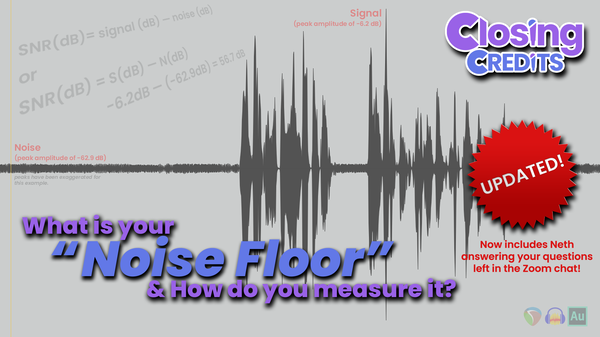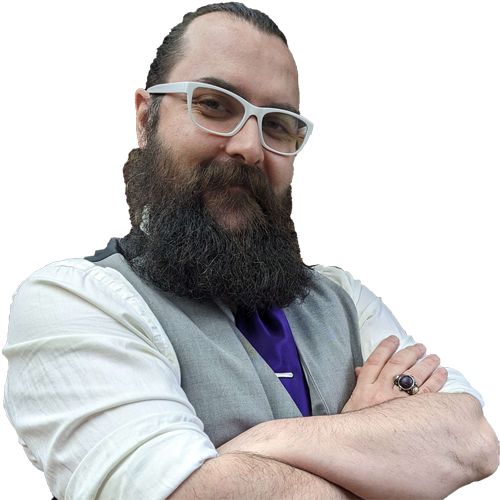Community
What is your "Noise Floor" & How do you measure it?

Hosted by

Laneth Sffarlenn
About This Event
If you have ever been asked to provide a sample of your "Noise Floor," or "Room Tone," did you have any idea just what the heck that person was talking about? (Oh, you did? Well goOD fOr YOu, Geraldine!)
For those who aren't Geraldine and weren't sure what those terms meant — or even for those who did know their meaning, but didn't know how to actually record or send a 'sample' of theirs — this basically means the working out difference between the volume of your voice when you are performing in your booth or recording space vs. the ambient volume of your recording space when you're not making any sound.
This can be quite a complicated topic and process, especially if the person asking you for your noise floor doesn't specific how they want it measured or what information specifically they are looking for, but that is what we're aiming to change here tonight.
Hi, I'm Laneth Sffarlenn. You might know me from such educational presentations as, "That Dude Rambled About REAPER For Two Hours, But Weirdly I Understand It Better Now," and "Okay, Seriously, That Is Enough Notes! STOP!" You might also know me as the beared Aussie wizard that assists Tony with the audio engineering courses here at Closing Credits, but enough about me.
Over the course of the next hour-and-a-bit, I hope to demystify some of the terms & techniques used in measuring the noise floor of your recording space, as well as showing you how to do so in a couple of different programs (Audacity, Adobe Audition, and my favourite, REAPER)
You'll also get a PDF that you can download that goes into a lot more detail and will explain way more than you probably ever wanted to know about all sorts of related and relevant terms and concepts.
So let's learn you some noise floors!
(...I may have written this at like 4 am on very little sleep and after watching a few too many Smosh compilation videos...)
Event Summary
Hey everyone, thanks so much for your patience! I've finally gotten to edit & upload the video which includes me answering the questions left by a bunch of folks in the Zoom chat.
Below you'll find not only the timestamps to specific sections of the session recording, but you'll also find a list of resources & downloads for you - and if you're reading this by email, I highly recommend reading these notes on the Closing Credits website event page, because they're just a bit easier to read there (and once certain things are fixed up, there might even be some embedded images & things to see as well - who knows? haha)
Again thank you for bearing with me while I dealt with a whole bunch of crap in my offline life. Here's to your thirst for knowledge, and your tenacity for sticking with me until I got you the notes I promised!
Neth.
Timestamps- 0:00:00 - Pre-event chatter
- 0:05:09 - Start Presentation (Slides)
- 0:08:13 - Terms used in measuring sound & audio
- 0:42:25 - "Gain Staging" vs. Normalization
- 0:57:52 - "Raw Audio" vs. RAW Audio
- 1:07:29 - So...what exactly IS the "Noise Floor" (as it relates to Voice Actors)
- 1:28:06 - Putting It All Together: Let's measure YOUR Noise Floor
- 1:30:12 - Recoring a "Home Studio Sample"
- 1:35:47 - Practical Demonstrations
- 2:22:05 - Q&A Time
- 3:26:29 - Chat Questions Answered (finally!)
- 3:26:56 - Colleen re:
- 3:30:41 - Kristoff re:
- 3:33:49 - Colleen re:
- 3:38:14 - Harvey re:
- 3:39:12 - Russell re:
- 3:43:43 - Zaqueri re:
- 3:46:54 - Zaqueri re:
- 3:49:15 - Colleen re:
- 3:56:24 - Thanks everyone! See you around the school & community!
Links and downloads to come.
Event Recording
About the Host
-

Laneth Sffarlenn
Neth studied audio engineering with Tony Wijs in late-2020 shortly before Closing Credits was launched, and has been working with Tony as his TA since. Having helped with the development of the Demo Engineering and Advanced Audio Engineering classes, Neth has also been providing one-on-one and small group support sessions for students that sought a more applied approach to learning REAPER than can be found with many pre-recorded courses available online.
As a practical (kinaesthetic) learner themselves, their hope is to provide an interactive learning environment where no question is unwelcome or to be considered silly. They'll readily admit if they don't know something, and guarantee that they'll be looking for an answer in their own time if not in the session itself!